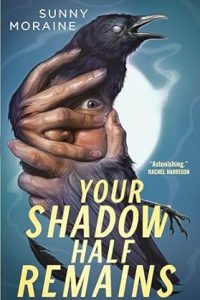Mouth by Puloma Ghosh: Review by Ian Mond
 Mouth, Puloma Ghosh (Astra House 978-1-66260-247-4, $26.00, 224pp, hc) June 2024.
Mouth, Puloma Ghosh (Astra House 978-1-66260-247-4, $26.00, 224pp, hc) June 2024.
Reading Puloma Ghosh’s debut collection, Mouth, brought me back to the pandemic and the months spent in lockdown. To be clear, not one of the eleven stories in the book takes place during or refers to COVID, but isolation and loneliness are so central to Ghosh’s work, her protagonist’s aching for intimacy, that my thoughts were cast back to those dark, secluded days. (I at least had my family and the distraction of work; others were not so fortunate). This makes Mouth sound like a grim affair, all misery and dirges. But that’s not the case. Surreal, scary, and sensuous, Ghosh writes with a lyricism that cleverly twists and reshapes familiar genre tropes, whether it be vampires, werewolves, time travel or ghosts.
Those elements – the loneliness, the creepiness, the eroticism, the gorgeous prose – are present in the collection’s opening story, ‘‘Desiccation’’. A teenage ice skater is goaded by her mother to make friends with fellow skater Pritha because as ‘‘the only other Indian girl… we looked more like each other than we did everyone else.’’ But there’s something not quite right about Pritha, pale, cold and precise, ‘‘terrifying when she competed [on the rink], waxy cheeks split by an uncanny lipsticked smile.’’ Our narrator decides that Pritha is not alive, which only makes her more alluring, awakening a desire to have Pritha ‘‘suck me dry.’’ What’s disquieting about ‘‘Desiccation’’ are the questions it asks but leaves unanswered. Is Pritha dead? Is she a vampire? And what about the Orwellian-like war against a hidden enemy that acts as a backdrop to the story – ‘‘there were no battles we could see, no bloodshed on the soil’’ – where all the men over the age of 17 are taken, never to return?
Similarly, ‘‘Leaving Things’’ is all the more unsettling because it refuses to connect the dots. The story takes place in a town experiencing lockdown, invaded by voracious wolves picking off the female residents. A vet who recently broke up with her boyfriend breaks the rules by taking home a sick, pregnant wolf. Sadly, she can’t save the animal, but before it dies the wolf bizarrely gives birth to a human child with ‘‘prominent canines, his nails sharpened to little points… [and] deep gold eyes like the she-wolf still lying dead on the tiles, emptying herself of blood.’’ I love this story, the way it’s initially about motherhood but then takes a turn that flirts with taboo with a climax that only seems inevitable, even predictable, on reflection.
We see the antecedents of stories like ‘‘Desiccation’’ and ‘‘Leaving Things’’ in ‘‘K’’, Ghosh’s earliest piece, first published on the webzine One Story. College student Kara is haunted every night by the silhouette of the ghost – the titular K – who once lived in the dorm room before she vanished without a trace. In her obsessive search to discover more about K, Kara encounters the college’s enigmatic groundskeeper – the last person to see K. And just like the protagonist from ‘‘Desiccation,’’ Kara is willing to risk her life for sexual intimacy and love. It’s a strange and beautiful story threaded with ambiguity.
Also strange and beautiful, but for entirely different reasons is ‘‘Anomaly’’. Here, Ghosh combines time wars, temporal anomalies, and dating online in a tale that’s awkward, funny, and more than a little bit unsettling. Unsettling also sums up ‘‘Lemon Boy,’’ a discombobulating tale that sees our narrator meet the titular character at a party held at her roommate Angela’s wealthy parent’s house. Lemon Boy is anxious, having just witnessed his dead ex-girlfriend, who had an unhealthy fascination with holes. What unfolds has a Lovecraftian quality, presenting the reader with an unforgiving universe inundated with negative space.
The collection’s themes reach a crescendo in the beautiful brutality of ‘‘Persimmons’’. Set on a distant world, a persimmon tree, the ‘‘single flourishing plant on a barren globe,’’ lures human colonists with a promise of abundance and fertility, provided a child born from its genetic lineage does not eat the fruit of the land and is fed to the persimmon when it’s hungry. Uma is that child. It could have been her mother. It could have been her child if she’d been quick enough to get pregnant. But the persimmon tree in their courtyard, bare for hundreds of years, is now green with leaves, ready to bud, sealing Uma’s fate. Ghosh’s evocative, fecund prose tenderly draws out Uma’s feelings of seclusion and isolation. She garners little love from her mother, who actively rids herself of the curse by getting pregnant with Uma. And while Moon, her boyfriend, loves her, it’s only when ‘‘he pretended she was just a girl.’’ Otherwise: ‘‘He never wanted to really see her, and he had no interest in saving her. Uma belonged to no one, not even herself.’’ It’s heartbreaking and horrific, especially toward the end when Uma’s mother, who has never shown her daughter a skerrick of love (‘‘‘Can’t you act like you want to be my mother, just for today?’ … ‘No’ her mother replied, never one to sugarcoat’’), admits that ‘‘I wanted to be your mother, I really did… But how could I? You were never mine.’’ The final few paragraphs, which lend the collection its title, are astonishing in how graphic, visceral and wonderous they are. Like all good collections, that last story leaves you wanting more. The excellent news is Ghosh is working on a novel. I can’t wait to read it.
Interested in this title? Your purchase through the links below brings us a small amount of affiliate income and helps us keep doing all the reviews you love to read!
Ian Mond loves to talk about books. For eight years he co-hosted a book podcast, The Writer and the Critic, with Kirstyn McDermott. Recently he has revived his blog, The Hysterical Hamster, and is again posting mostly vulgar reviews on an eclectic range of literary and genre novels. You can also follow Ian on Twitter (@Mondyboy) or contact him at mondyboy74@gmail.com.
This review and more like it in the August 2024 issue of Locus.
 While you are here, please take a moment to support Locus with a one-time or recurring donation. We rely on reader donations to keep the magazine and site going, and would like to keep the site paywall free, but WE NEED YOUR FINANCIAL SUPPORT to continue quality coverage of the science fiction and fantasy field.
While you are here, please take a moment to support Locus with a one-time or recurring donation. We rely on reader donations to keep the magazine and site going, and would like to keep the site paywall free, but WE NEED YOUR FINANCIAL SUPPORT to continue quality coverage of the science fiction and fantasy field.
©Locus Magazine. Copyrighted material may not be republished without permission of LSFF.









